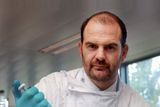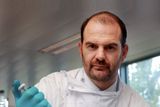Weight loss of 15pc recorded in new obesity drug trials involving UCD professor


Patients with obesity have lost up to 15pc of their body weight in trials of a new drug that far outperforms competitors such as Ozempic and which was researched by a UCD scientist.
The findings about the new medicine, called CagriSema, were announced in Chicago at the 85th Scientific Sessions of the American Diabetes Association.
“The REDEFINE 2 study showed that CagriSema, a new treatment in development for the disease of obesity, can allow patients with type 2 diabetes lose 15pc body weight, while putting their blood sugar levels back in the normal range,” said Professor Carel Le Roux, a leading weight-loss researcher at the UCD Conway Institute and a principal investigator on the study.
Today's News in 90 seconds - Sunday June 22
“What patients often tell us is that they again can do all the things they want because they feel so much more functional,” said Prof Le Roux.
“We also see that the side-effects are manageable and clinicians are getting much better at reducing common side-effects. Taken together, this will allow clinicians to control the disease of obesity, which will allow us to disrupt the disease of type 2 diabetes.”
CagriSema is a combination of Cagrilintide and Semaglutide. The latter is marketed under the brands of Ozempic, Wegovy and Rybelsus.
CagriSema is seen as a potential follow-on treatment for people already being treated for obesity and type 2 diabetes, or both, with Ozempic and Wegovy or Mounjaro – a drug that slows down the rate at which food leaves the stomach.
Semaglutide, a so-called GLP-1 analogue, is better known as Ozempic. Cagrilintide is an analogue of amylin.
An analogue in chemistry is the name for something that is similar, but not identical to something else, and often mimics its action inside the body.
The GLP-1 analogues, which include Ozempic and Wegovy, act by imitating incretin, a natural hormone that decreases blood sugars and reduces appetite.
Amylin is another natural hormone in the body and one that promotes satiety – the feeling of being full after eating.
“In a phase three clinical trial, participants with type 2 diabetes and obesity experienced unprecedented weight loss,” said Prof Le Roux, who said that the CagriSema trial “marks a turning point” in weight and diabetes management.
“Many participants expressed joy in regaining abilities that their condition had previously hindered – playing with grandchildren, tying shoelaces and performing daily activities became accessible once more.”
The treatment, said Prof Le Roux, involved a weekly injection, which enabled patients to manage their disease and also accommodated healthier lifestyles.
The REDEFINE trial results offered a “beacon of hope” for people living with type 2 diabetes and obesity, he said, with results that promised to promote not just weight loss, but to enhance people’s quality of life and well-being.
“Patients can look forward to a future where managing diabetes can lead to healthier lifestyles and renewed vitality,” said Prof Le Roux.
Join the Irish Independent WhatsApp channel
Stay up to date with all the latest news














